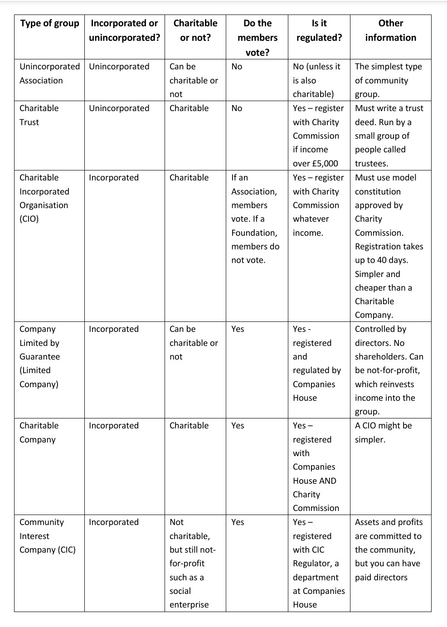Team Wilder Resources Community Group Types
An Unincorporated Association
If you’re just a small group of volunteers, with no plans to employ staff or rent premises, this is the one for you.
It’s the easiest group to set up. All you need is to write a “constitution” or “governing document”. This is a list of rules for the group. It also says what your group’s going to do, and how it’s going to do it.
This kind of group:
- doesn’t have to be a charity (although you can set up a charity if you want to). You will need to get official advice if you want to be a charity.
- isn’t a separate legal structure. This means the group can’t take on a contract or own property - but individual members can do.
- has members who vote on what the group should do.
- the group can become a different type of group or a charity later.
Incorporated and Unincorporated
The difference between these two things is just whether your group has a separate “legal personality” of its own. An incorporated group can employ people, take on a contract or rent property. If there’s any debt, that debt belongs to the group not the people running the group. This means an incorporated group is more regulated than an unincorporated one. You’ll probably need help from accountants and solicitors.
Examples of incorporated groups:
- Community Interest Company (CIC)
- Company Limited by Guarantee
- Charitable Incorporated Organisation
- Community Benefit Society
- Cooperative Society
-
On the other hand, an unincorporated group is just a group of individuals. If someone gets into debt on behalf of the group, then that person is liable for that debt. As most community groups are very small and don’t handle a lot of money, the risk is actually low.
Examples of unincorporated groups:
- Unincorporated Association
- Charitable Trust
- Constituted Society
More advice here: My Community

© Broni Lloyd-Edwards
Are You Charitable?
A charity is defined in law in England and Wales as a group which has only charitable purposes. It’s regulated by the High Court. You’ve got to prove you exist for the public benefit. If your income is more than £5,000 a year or you’re a Charitable Incorporated Organisation, you must register with the Charity Commission. Look at the official guidance on the Government website here: Government Guidance: Charity Definition
Watch out! A “charity” is not a legal sort of group on its own. In fact, most charities are one of these:
- Unincorporated Association
- Charitable Trust
- Charitable Incorporated Organisation
- Company Limited by Guarantee
- Charitable Community Benefit Society
These groups can’t be charities:
- Community Interest Company (CIC)
- Cooperative Society

Community Group Types
Resources

National Lottery Heritage Fund
Be part of Team Wilder
All actions for nature collectively add up and creates life for people and wildlife.
Share your actions for nature, like Tom by sharing and tagging @avonwt on social media and
Log your actions for nature on the map











